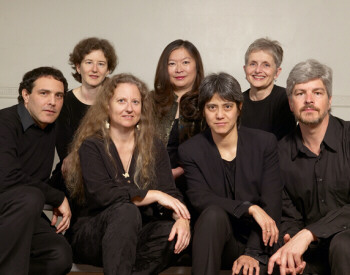Earplay explores limits of form in end-of-season concert
Earplay, a mainstay of the Bay Area contemporary music scene, ended their 23rd season with “Intricate Inventions,” a program which samples the last 30 years of musical evolution.
Just as art movements question their basic tenets, exploring perspective and ground, reality and ownership, these modern composers argue with conventional uses of texture, tension and found-form. Nor do they shy from a writer’s question of symmetry and narrative line.
Christopher Burns’ Xerox Book pays homage to the eponymous artists’ book which looks at multiples and the destruction of the original. Burns’ nine short movements pit Ann Yi on piano against Chris Froh on marimba, finding the percussive roots of piano in abrupt and dissonant passages. Burns’ version of Xeroxing compresses and distorts the piano phrases, prefigured by marimba and mocked by snare. He ends with low piano chords, and snare completes the shift to jazz.
Long time Earplay members Peter Josheff, clarinet, Karen Rosenak, piano, Terrie Baune, violin and Tod Brody, flute were joined by frequent collaborator cellist Dan Reiter for Salvatore Sciarrino’s “Lo spacio inverso.” This internal “inverted space” was anchored by clarinet multitones. Josheff was able to substitute a longer-than-standard clarinet to mimic the B-flat foot of the European clarinet for which the piece was written. This was necessary to play the harmonic multitones, simultaneous pitches created by opening midpoint keys.
Sciarrino, both composer and writer about music, describes his composition as “…a notebook of broken universes. No continuity, no fragments, no dialectics…A melody of emptiness.”
And yet he infuses this minimal canvas, like the Jasper Johns “gray” paintings, with a world of subtle tension. Even the silence becomes thickened, as inward breaths between clarinet monochromes create a new composition: a negative image reinforced by lacy cello harmonics and thrum of bounced bow.
Hector Parra’s Trio “Wortschatten”, a US premiere, measured extremes, with high screech of violin dying away among bass piano notes. It opened with Thalia Moore’s sea-sick cello groaning as her fingers slapped and slid along strings.
“Presto con fuoco,” written by Beat Fürrer in 1997, pitted flutist Tod Brody’s careful exhalations against Brenda Tom’s severely limited piano chords. More argument than dialog, the instruments gradually become aware of each other. The flute moves from breaths to pitches, piano responding with runs of notes. Then they continue to evolve past each other into shorter and shorter phrases, the remnants of erasure and over-writing.
Fürrer speaks to the unvoiced, moves from counterpoint to antipoint, and accelerates past our observation.
The second half of the program was dedicated to Peter Maxwell Davies, whose influence on contemporary music has been celebrated by his inclusion at all three of this season’s concerts.
Woodsy and mysterious, Ave Maris Stella takes its name from an eighth century Latin plainchant used by Palestrina and later composers. Both early church theme and late Beethoven quartet find their way into Davies’ composition. Noted to be performed without conductor, the funereal pacing hides complex rhythms which make that nearly impossible. Mary Chun’s attentive conducting of the ensemble retained a chamber quality while keeping the cross-rhythms viable.
Davies uses mathematical manipulations, in particular the “Magic Square of the Moon,” a 9 x 9 matrix, to derive pitch and tone length. But this intellectual approach enters a realm where over-calculation creates its own form of randomness. On asking a performer at the post-concert reception whether the piece had any climax or denouement, I was told it was “a story without a story-line.”
And what a curious story: Davies’ bold use of marimba, convincingly performed by Daniel Kennedy, is a backbone for a motif which travels from cello to flute to viola. He ends with double-tongued clarinet and viola chords treading parallel paths, a cacophony of honking geese.
—Adam Broner
Originally published in the Piedmont Post
Earplay members from left: Tod Brody, Ellen Ruth Rose, Terrie Baune, conductor Mary Chun, Thalia Moore, Karen Rosenak and Peter Josheff
